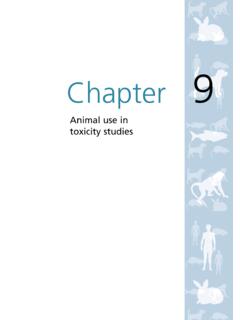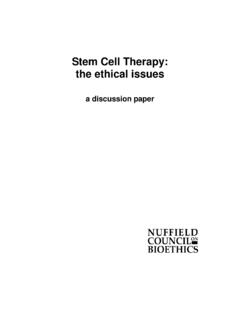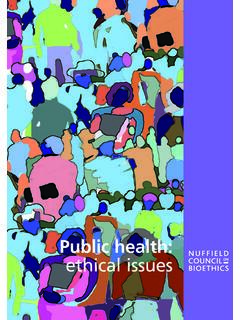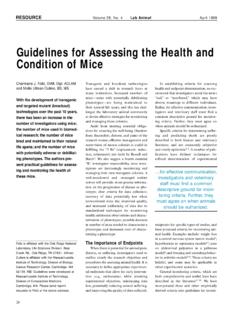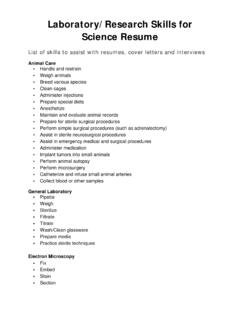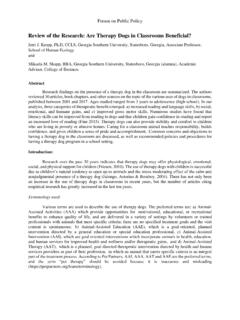Transcription of Animals Chapter 3 Ethical Issues Raised by Animal Research
1 Chapter 3. Ethical Issues Raised by Animal Research T h e e t h i c s o f r e s e a r c h i n v o l v i n g a n i m a l s Chapter . Ethical Issues Raised by Animal Research Introduction As we have said, the debate about Research involving Animals ranges broadly over two 3. distinct questions. The first asks whether Animal Research yields useful knowledge that could Ethical . not be gained from other sources. The second concerns whether it is morally acceptable for humans to use Animals in ways that can cause them harm. These two questions are clearly related: if it were the case that we learn nothing useful and distinctive from Research that may harm Animals , it would be difficult to see how, on any reasonable view, it could be Issues . morally justified. The question of scientific justification is therefore fundamental to the question of moral justification and we explore it in detail in Chapters 5 10. However, a positive answer to the scientific question does not settle the moral question, for it may be the case that an experiment that yields useful and relevant information is not Raised .
2 Ethically acceptable. We need therefore to consider from first principles the arguments in support of, and against, Research involving Animals . For the purpose of our discussion, we take the principal Ethical questions to be the following: Provided there are substantial benefits associated with Animal Research , why should the BY. use of Animals require special justification? Animal . Can any use of Animals by humans be justified? Which specific Issues need to be considered in the case of Research ? What role does the unavailability of alternatives play in the justification of Research involving Animals ? Research . How does the justification of such Research relate to the justification of other uses, such as food production? What is the appropriate role of regulation for Research involving Animals ? For each of these questions, we consider commonly encountered arguments to bring clarity to the debate; to identify agreement where it exists; and to understand what lies behind remaining disagreement.
3 We hope that this approach will be useful in enabling readers to make informed judgements about whether or not specific types of Research , as described in Chapters 5 9, can be justified. We would also like to encourage them to reflect upon the assumptions behind their own positions and those of others. Facts, values and the reflective equilibrium Historically, a number of apparently rigid and irreconcilable implicit and explicit Ethical positions on Animal Research have arisen. Often, holders of these views think that their Ethical judgement is irrefutably right, while that of others is simply wrong. Consequently, they consider truths about Animal Research to be self-evident, and suspect those who do not share these views of some sort of moral astigmatism' or intentional malevolence. This state of affairs raises complex philosophical Issues that are usually debated under the title of moral epistemology. The term refers to the study of, among other things, whether and how we can come to know moral truths; what we mean when we make moral judgements; and under what conditions we can change the moral judgements of Although this Report is not suited to a detailed exploration of the many subtleties that 1 See Campbell R (2003) Stanford Encyclopaedia of Philosophy: Moral epistemology, available at: Accessed on: 11 Apr 2005.
4 33. T h e e t h i c s o f r e s e a r c h i n v o l v i n g a n i m a l s characterise this subject, we think it important to draw attention to two fundamental Issues relevant to our discussion. First, the relationship between facts and values is not straightforward. A reasonable discussion between people of differing opinions requires clarity about whether the exact area of disagreement concerns: knowledge of facts (disagreement about whether or not a particular Animal suffers from being used in a particular kind of Research , or about the actual conditions of the Research environment);. the interpretation of values associated with facts (agreement that Animals involved in a particular experiment experience pain, but disagreement about whether or not causing this pain is morally wrong); and the way that values are derived from facts (disagreement about whether or not Animals are capable of being members of the moral community', and if they are, how we might know, see Box ). Secondly, even if the source of disagreement is identified, the question arises of what to do if one's own moral judgement is in conflict with new facts, evidence or arguments presented by others.
5 On one view, such disagreement is unavoidable and, in principle, irreconcilable. Since facts are usually interpreted differently within frameworks of different Ethical theories or belief systems, it is not surprising that proponents with different viewpoints will differ in their judgements. However, this is only true if Ethical frameworks are construed as being unchangeable in principle. On a different view, new circumstances may enjoin us to test and, where necessary, revise our frameworks. This can apply to both proponents of particular Ethical theories, as well as to people who have not considered Ethical Issues Raised by Animal Research in a systematic way, but who nevertheless hold strong views. These processes of revision are sometimes described as striving to achieve a reflective equilibrium' which consists: in working back and forth among our considered judgments (some say our intuitions'). about particular instances or cases [the relationship to judgments about similar cases], the principles or rules that we believe govern them, and the theoretical considerations that we believe bear on accepting these considered judgments, principles, or rules, revising any of these elements wherever necessary in order to achieve an acceptable coherence among them.
6 The method succeeds and we achieve reflective equilibrium when we arrive at an acceptable coherence among these beliefs. An acceptable coherence requires that our beliefs not only be consistent with each other (a weak requirement), but that some of these beliefs provide support or provide a best explanation for others.' 2. Thus, consideration of the many ways in which Animals are used in Research may require us not only to simply apply our system of beliefs to this specific matter but, in doing so, to accept the possibility that some parts of our belief system may require revision. Openness towards such a process would lead to more refined Ethical theories and belief systems and it could also help identify possible policy reforms to generate practices that are acceptable to those holding a range of moral In this Chapter , we generally do not take a view as to whether or not, and if so on what basis, particular arguments in favour or against the use of Animals in Research are justified.
7 Rather, we comment on possible weaknesses of specific arguments and return to a more detailed outline of specific positions in Chapters 14 and 15. 2 Daniels N (2003) Stanford Encyclopedia of Philosophy: Reflective equilibrium, available at: #1. Accessed on: 11 Apr 2005. 3 See also Thagard P (2000) Coherence in Thought and Action (MIT-Press). 34. T h e e t h i c s o f r e s e a r c h i n v o l v i n g a n i m a l s Chapter . Provided there are substantial benefits associated with Animal Research , why should the use of Animals require special justification? The primary reason given for using Animals in Research is to ensure scientific progress in basic and applied biological and medical science. Few people would deny that science is an important and powerful way of understanding the natural world. Methodical observations 3. of evidence produced in carefully designed experiments have helped us to understand, for Ethical . example, a great number of physical and chemical principles that govern biological processes.
8 Many scientists argue that Research involving Animals is crucial in continuing As several respondents to the Consultation observed: If it is accepted, as it should be, that prevention of human suffering is a moral Issues . obligation, then the use of Animals is unavoidable.'. Dr Chris Jackson Man has the duty to treat sick people as well as save lives of people and Animals . In order to do so, he must improve his knowledge of biology, and human and veterinary Raised . medicine. That is why man carries out Animal Research where there are no other appropriate investigational methods.'. ABPI. We do not feel it is Ethical to subject humans to these risks [the prolongation of BY. disease or risk in toxicity testing ] when there is a means to reduce them.'. Animal . Genetic Interest Group On the basis of these views it might appear that Animal Research requires no further justification. But, there are also people who assert that the use for harmful purposes of one species by another, without consent, is fundamentally unethical, regardless of any possible Research .
9 Benefits, and that all forms of Animal Research must therefore be Instead, they argue that more effort should be made to find alternative ways of obtaining the required information, for example by undertaking Research on human volunteers or on human tissue. Those who disagree assert that there are many significant Research questions which can only be answered by using Animals and that they are only used when absolutely necessary. They also question whether an abandonment of Animal Research , and the implied consequences, would be acceptable to all members of society. This situation leads us to two more specific questions. First, how important is the alleviation of human and Animal suffering, in view of the fact that it may cause pain, suffering and distress to Animals involved in Research ? Secondly, why should the use of Animals in Research be acceptable in cases in which it would be unacceptable to use humans? We address these questions next. Is there an obligation to alleviate suffering?
10 At the most fundamental level we can question why, in principle, there should be a moral obligation to undertake Research to alleviate suffering in either Animals or humans. Based on a particular view about the status of responsibilities that arise from things we do as opposed to things we do not do ( acts versus omissions'), we could assert that there is no such duty. The argument would be that the strongest moral requirements are negative, relating to things which we should not do (omissions). Weaker positive moral requirements concern obligations in relation to things which we should do (acts). So, for example, we could argue that there is a strong obligation not to harm any child, but a far weaker one, possibly even 4 RDS Welcome to RDS Online, available at: Accessed on: 13 Apr 2005; see also Chapter 1, footnote 5. 5 BUAV BUAV Today, available at: Accessed on: 13 Apr 2005. 35. T h e e t h i c s o f r e s e a r c h i n v o l v i n g a n i m a l s none, to give personal support to every child.


